Age group 3 10 to 12 years old
Body
Many children feel increasingly uncomfortable in their bodies at this age, especially when the signs of puberty start. Think about how you felt at that time, what your wishes and fears were, what you did about annoying pimples, where you got your answers to burning questions - and talk openly about it with your child. Such conversations are usually very helpful for children because it is not about them and they learn that parents also felt the same way.
Below is an example of how to start a puberty talk.
"During puberty there are many physical changes. Some changes you notice because they become visible. Others happen invisibly inside your body. This is true, for example, with the onset of puberty. This is when the pituitary gland - a gland at the base of the brain - tells the body to increase the production of certain chemical substances called hormones. The physical changes you notice in yourself are mainly caused by these hormones. All children go through puberty. Some earlier, some later. It's like a party where not everyone comes at the same time, but at some point everyone is there."
All children are looking for answers about their bodies. But they also have questions about the body and development of other genders. The following information should be given to all genders. This is important to create mutual understanding. It is exciting for children to acquire knowledge of their own and others' bodies.
For most people, the following happens in and on the body during puberty:
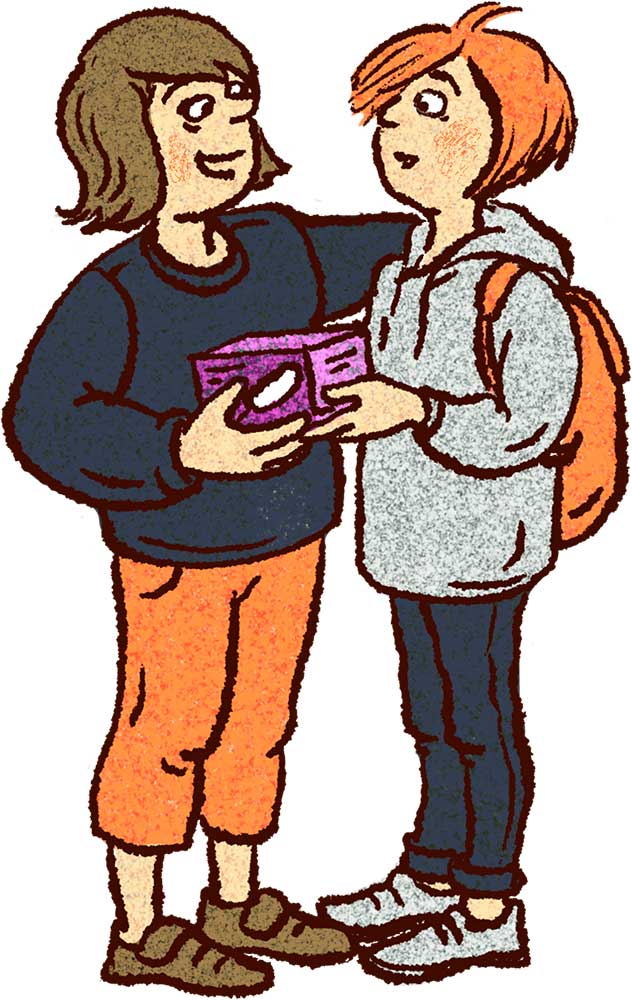
Girls' bodies
In girls, the hormones oestrogen and progesterone, which are produced in the ovaries, are responsible for physical changes during puberty. Armpit and pubic hair begin to grow. The breasts begin to grow, the hips become wider and the girls develop a waist. What is not visible to the girl at first is the maturation of the eggs, which begins in the ovaries. From this point on, a girl can become pregnant, she is now sexually mature. For every girl, this change becomes visible when menstruation occurs for the first time as a result of the first egg maturation.
Girls who have their first period at an early age often feel alone in dealing with the issue, because their friends cannot talk about it yet, their developmental stage is still pending.
Menarche, or the first period, occurs in most girls between the ages of 11 and 15. Before that, a "white discharge" - a milky-white fluid - may come out of the vagina as a "precursor" to the first bleeding. This happens because girls have always had ovaries with thousands of eggs in the abdominal cavity. These eggs are in a kind of "hibernation" until the girl reaches puberty. Then hormones (messenger substances) make sure that the eggs become active. Ovulation is irregular at first, but the period becomes regular on average after 6-24 months.
Gynaecologist
Menstruation is not an indication to have a check-up, but rather that everything in the body is in order. As soon as you intend to have sexual intercourse, you should have a gynaecological examination and a discussion about contraceptives. The topic of safer sex, i.e. the avoidance of sexually transmitted infections, must also be discussed.
Intimate hygiene
For cleaning the vulva (smegma, a yellowish/white substance made of sebum, can accumulate in the folds of the skin), clean water and, if necessary, a flannel is sufficient. If you wish, you can use a pH-neutral soap. Intimate lotions and sprays are unnecessary and hazardous to health, this can disturb the environment of the vagina and make the vulva and vagina itch.
When you have your period, you can use panty liners or pads to keep the blood out of your underwear, as well as tampons or menstrual cups.
Talking about menstruation early and shopping for intimate hygiene, including packing it in their school bag, saves unpleasant surprises. Panty liners and pads should be freely available. For most girls, the thought of inserting a tampon into their vagina is still relatively unimaginable. That's why most use panty liners at first, and pads when the bleeding is heavier. However, tampons are a topic that you should discuss (size, insertion, correct fit), but do not pressure your child to use them. But also do not discourage them when the time is right for them. Nevertheless, tampons have been in the scientific and media spotlight for some time now because they carry the risk of infection, especially if they remain in the body for too long. Also, most tampons (and also pads) are chlorine bleached and thus hazardous to health. In addition, they absorb not only menstrual blood but also parts of the vaginal mucosa. This combined with the fact that we menstruate around 500 times in a lifetime and thus consume a lot of money and produce a lot of waste are disadvantages that are causing more and more people to turn to alternative menstrual hygiene: for example, washable cloth pads, menstrual briefs and long-lasting menstrual cups.
The myth of the "hymen":
Many girls are afraid that the use of tampons could tear the "hymen". Put your child's fear to rest: there is no hymen that closes the vaginal entrance. There is a ring of mucous membrane (also called vaginal corona), but this bleeds in very few girls during the first penetrative sexual intercourse.
The myth that "it always hurts the first time":
Unfortunately, this sentence is very persistent, which leads to young people assuming that this is simply part of the first penetrative sexual intercourse. In very few exceptional cases, it is indeed possible that the vaginal ring (see above) covers part of the vaginal opening and then tears. In the vast majority of cases, however, it is the muscles of the vagina that contract rather than relax. This can be because you are not ready, too excited, not wet enough, anxious, etc. An important message here is to simply take more time.
Intersex bodies
Some people are born with intersex genitalia. However, the vast majority of intersex people only discover this later in life - for example during puberty, when hormones cause the body to change in a way that one might not have expected: e.g. onset or absence of voice change, menstruation, breast growth, beard growth/body hair, growth of the erectile tissue. Around 1.7 per cent of the population has intersex sexual characteristics.
Boy's bodies
In boys, the hormone testosterone is produced in the testicles. One visible physical change in boys is the increased growth of body hair. Beard growth begins. Hair begins to sprout on the armpits and scrotum. There is an audible change in the voice. The production of sperm cells takes place invisibly in the body. This happens in the testicles and means that a boy can now father children. This becomes noticeable when ejaculation occurs for the first time.
"Boys get their first ejaculation" - and are usually not prepared for it.
Change this and take the pressure off your child, who may think he has wet the bed again:
"When boys reach puberty, the testicles begin to produce sperm cells. It will continue to do so until the end of their lives. The sperm cells are stored in the epididymis. When these "warehouses" are full, millions of sperm cells come out mixed with a liquid at the penis. The amount is about one tablespoon. For the first time, this usually happens between the ages of eleven and fifteen."
From the first ejaculation, one is sexually mature.
Intimate hygiene
Discuss how to wash their private parts properly to avoid smegma (a yellowish/white substance made of sebum): the foreskin must be retracted and the glans and the lower edge of the glans must be cleaned with the hand and clear water. If retraction is difficult and painful, this may be a sign of foreskin phimosis. This should be clarified by a urologist. In most cases, it is possible to loosen these adhesions with the help of creams. Partial or complete removal of the foreskin is not always necessary and should not be the first choice because there are many sensitive nerve cells in the foreskin that can be important for the feeling of pleasure. However, there may be a medical indication for (partial) circumcision, i.e. male circumcision. If necessary, get a second medical opinion and involve your child in the explanation and decision. Circumcision is not usually necessary until puberty has occurred. In some cultures, circumcision is performed without medical necessity.
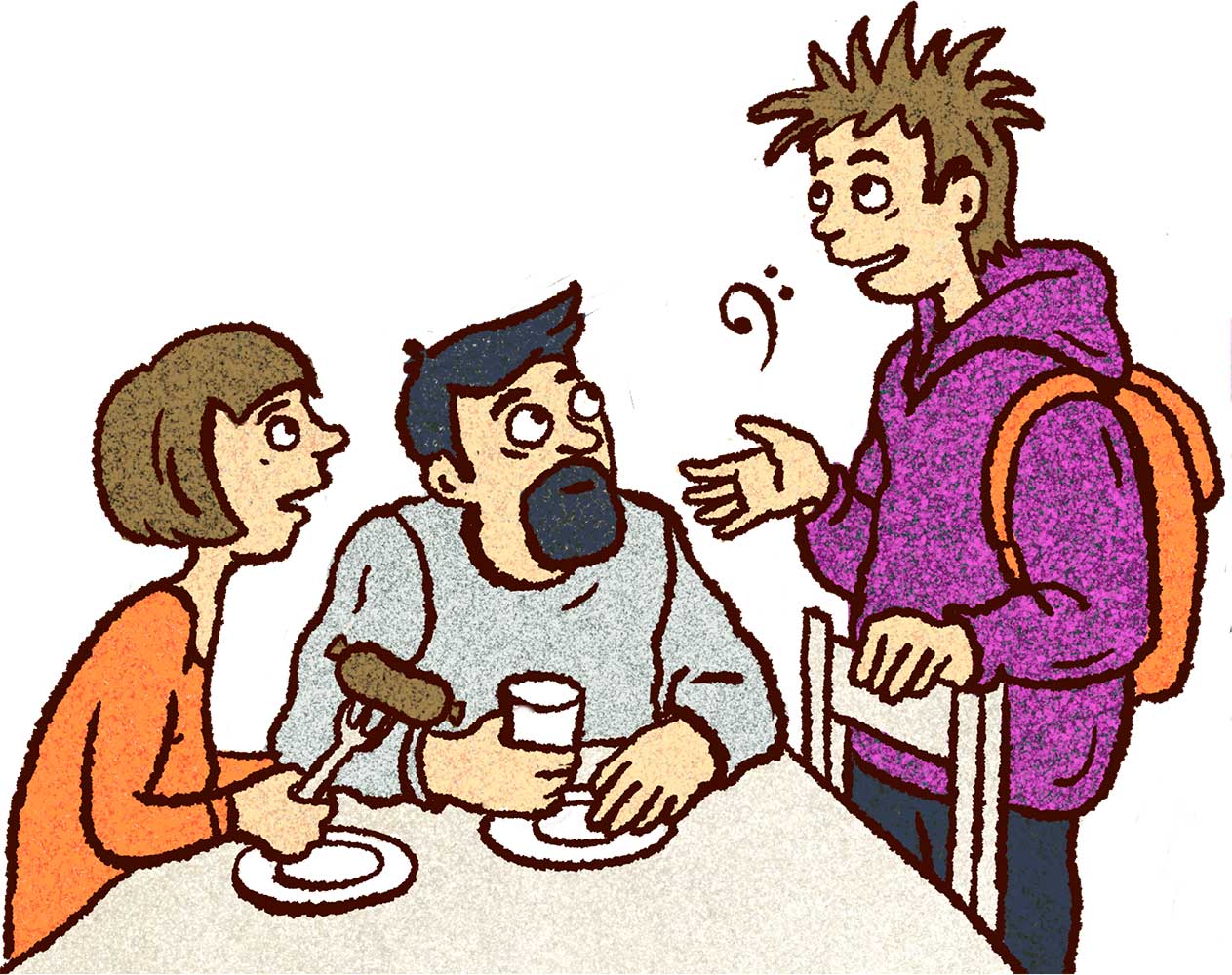
Voice change
Boys begin to experience a change of voice. This process will take a while and will be accompanied by croaking and squeaking. Girls' voices also change. However, this is so slight that it is not noticeable. Nevertheless, the voice of girls also becomes somewhat deeper.
All bodies
General personal hygiene
Body hygiene is more important now. Because during puberty, the skin is likely to become oilier, you sweat more, pimples can appear and body odour changes. These are consequences of sebum production, which is stimulated by hormonal changes in the body. Talk to your child about the fact that body odour caused by sweat means that they have to wash more often. In case of severe pimples or acne, consult a dermatologist to avoid scarring.
Sexual arousal
People get sexually aroused by fantasies or visual stimuli (real bodies, pornography). The vagina becomes moist, vulva lips and clitoris swell, nipples become stiff. The erectile tissue of the penis fills with blood and makes it erect. Breathing becomes faster, blood pressure and heart rate increase.
Many boys cannot hide their sexual excitement - an erection is not yet controllable and happens to them in the most embarrassing situations. It does not only have to do with sexual desire, but is also a reaction to physical stimuli (so-called "morning wood").
Masturbation
It is important not to judge or even forbid it as an adult. Masturbation is a way to discover and enjoy one's own body and sexual pleasure. Masturbation is sex with oneself and in no way causes physical or psychological harm - we can finally leave our grandparents' myths behind us!
Sexuality and the media
Today, our children are exposed to pornography at a very early age: as soon as they have access to a smartphone, tablet or PC with internet function, they are confronted with it. It does not even need to be their own device. You cannot protect them from it. But you can prepare them for it: by providing a caring foundation for discussing sexual topics at an early stage; by answering all their questions and also addressing the topic yourself if no questions come up. Children think they are watching a documentary when they see porn: "So this is how sex works". Talk to your child about the fact that sex is something that people do who love each other, if that is what both of them want and it is nice for both of them. What you see in the video has little to do with that, it caters to people's fantasies.
You will probably try to put protection or filters on the devices or put a family PC in the living room: these are important precautions. Nevertheless, it will not stop contact - perhaps through other children - with pornography. Stay in touch with your child, take an interest in what they are watching. At this point at the latest, it will pay off if you have been able to make the subject of sexuality an easy topic to talk about - because then your child will come to you with questions about this for a long time.
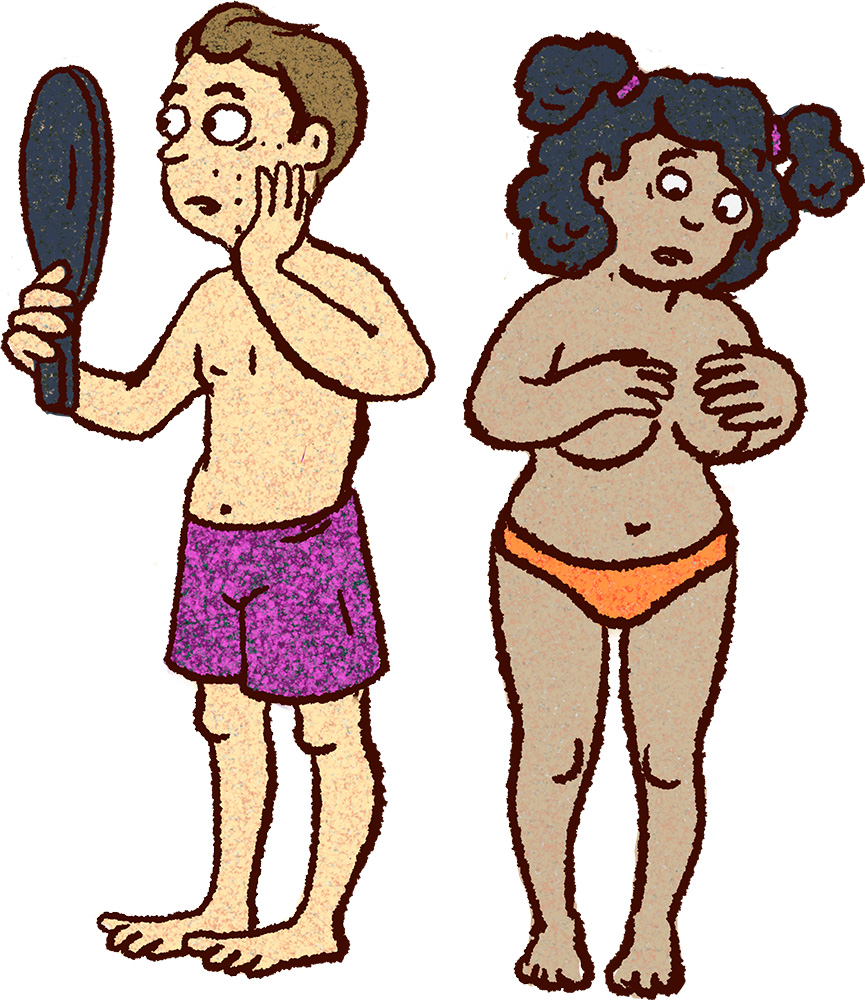
Body images
As a result of living in a world of media, which children are exposed to from an early age, they adopt certain ideals: what should boys look like, what should girls look like? These already unattainable ideals, which are often produced by Photoshop, expose young people to high pressure and expectations: looking like a model is considered the goal. To achieve this, many young people are willing to endure a lot: diets that can lead to eating disorders, dietary supplements, excessive visits to fitness clubs and often, already in adolescence, the desire to surgically adapt the body to an ideal.
The earlier children learn to perceive their body as something special, to feel good in it, to do something good for it, to like many (if not all) parts, to accept others, the easier this will be for them during puberty. After all, puberty is a time when you do not know what your body will look like "afterwards": everything grows, sprouts in different directions. This can be unsettling. Encourage your child that he or she is unique - that all bodies are unique. Watch videos together that show how much people can be changed on screen and that this does not correspond to reality.
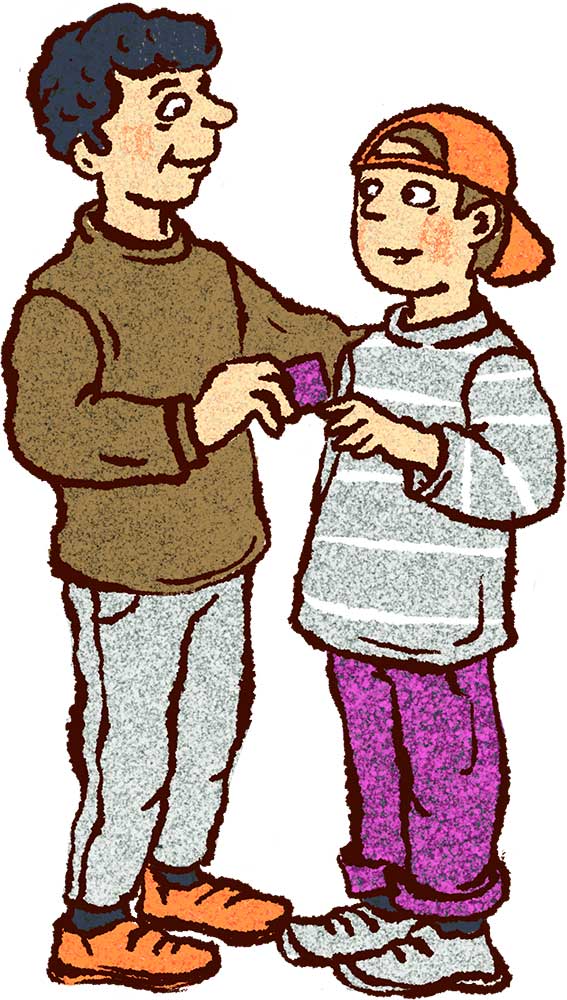
Sexual activities, contraception & safer sex
Talk to your child about contraception even at this age. Not because they will need it in the near future (according to the Durex Report 2015, the average age across Europe is 18.5 years), but - on the contrary - because they are still so far away from it.
For girls, the following statement is important and relieving:
"You decide when the time is right for your first time. Rely on your feelings and don't let anyone push you! It is normal to feel a little anxious and insecure. If these feelings are very strong, you may not be ready for sex. Maybe you should wait a little longer. However, the first time can also be exciting and thrilling. It helps if you and your partner have enough time together and are undisturbed. Talk to each other about what you want and how you feel."
Of course, boys should not let themselves be pushed into anything either, not by friends or by the media.
"If a man and a woman want to have sex without the woman getting pregnant, they must use contraception. For example, the woman can take the pill, the man can use a condom."
Safer sex
Homosexual as well as heterosexual adolescents who want to become sexually active need information on sexually transmitted infections and how they can protect themselves from them. They should also know what to do in case they get itchy or have foul-smelling discharge. Condom use should be promoted more among young people. Used condoms are often found in playgrounds and car parks, and children are familiar with condoms from the supermarket or the public toilet. It is the only contraceptive that protects against diseases during heterosexual as well as homosexual sexual intercourse. Dental dams fulfil this function during vaginal oral intercourse. If you have the opportunity to visit a counselling centre that offers sexual education workshops, take advantage of the offer. Young people often find it easier to talk about these topics with an outsider. A visit to a counselling centre or gynaecological consultation should be made if a couple is planning to become sexually active with each other. Here, the young people are introduced to the contraceptives in question with their advantages and disadvantages and, if necessary, a prescription for hormonal contraception is issued. The topic of safer sex should also be discussed.
Identity
A "different" sexual orientation or gender identity is not a disease
Why and when a person determines who he/she loves is a personal matter and a product of emotions. The preconditions that determine a person's sexual orientation are very diverse. However, one thing that can be said in any case is that it is not the result of socialisation or parental upbringing, nor is it the result of seduction. The idea that a woman becomes a lesbian because she sees lesbian couples or a man becomes gay because they talk about gays in class has been disproven scientifically. You as a parent also have no influence on the sexual orientation or gender identity of your child. It was and still is discussed throughout the world that homosexuality is a disease that can be cured by certain therapies. This is also not true. In 1992, the WHO (World Health Organisation) removed homosexuality from the worldwide health catalogue (ICD 10). Therefore, medically and legally, it is not considered a disease. Trans is also not a disease, but merely the feeling that one's biologically assigned gender does not correspond to one's own feelings. This is addressed in the new WHO health catalogue (ICD 11), which takes effect in 2022, and speaks of gender incongruence, i.e. the lack of correspondence between the body and the feeling of gender.
The inner coming-out of a child can start very early. From the age of 10, the child may have a feeling of being "different". It is not uncommon for children to then lack terms and try to suppress their true feelings for a longer period of time or do research on their own on the internet. In doing so, they may also receive disturbing information. To prevent this, you can provide your child with information about sexual orientations and gender identities at an early stage and thus support them in understanding them. These kinds of conversations should not be held only if something seems to be "different" - an open approach to these topics in your family leads to acceptance of gender and sexual diversity, strengthens your child and helps to build an open and discrimination-free society.
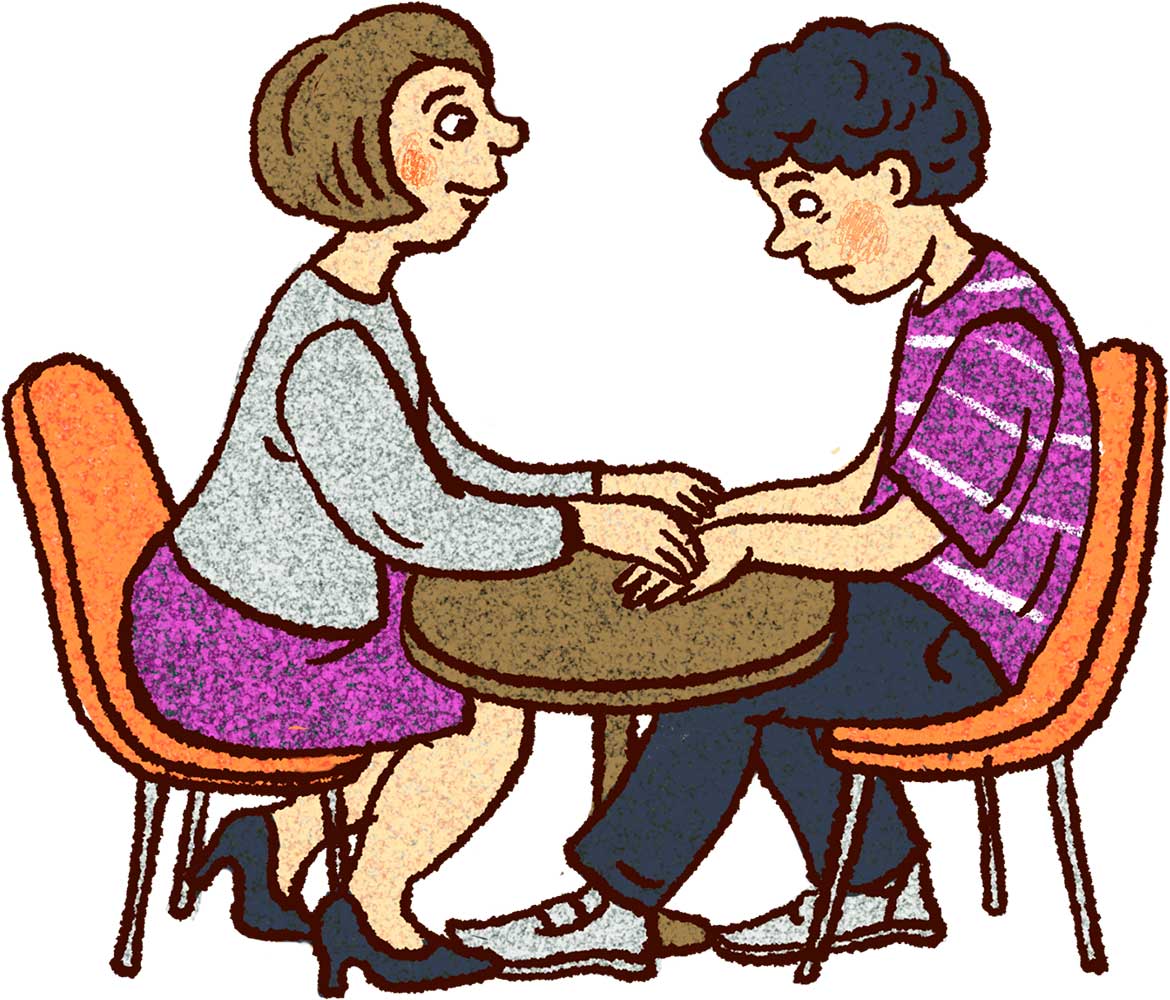
Young people need family support and protection from discrimination
The central theme of (pre-)puberty is finding one's identity. The concept of self that your son/daughter developed in early childhood is reviewed and possibly changed. Children form their own personal distinctive gender and sexual identity. Associated with this is the feeling of being free, of being comfortable in one's own body and of being recognised as an independent person. In this complex process, children can benefit from an open confrontation with society and its values and norms. In this process, they need support from you and other family members.
What can you do?
Talk to your children about their feelings and help them form their own opinions. Give them support and honest feedback. This will help them develop their own value system. Engage with your child and respect their values and priorities, even if you do not necessarily approve of them, e.g. if they want to dress in a gender-atypical way, express hobby/career aspirations and do not want to conform to stereotypes.
All children need support and assistance during this time. However, queer children and young people face particularly great challenges. Only those who deviate from the social norm must, in the view of the majority, admit it, i.e. come out. What people often forget is that heterosexual people come out as a matter of course, without being judged: heterosexual couples walk hand in hand in public and kiss in the street, the teacher talks about his wife or the girl dances with the boy in the club.
Queer youths are rarely seen in this context. Neither are they seen in public, nor can they be found in school textbooks, work materials, prime time films, etc. Their coming out therefore seems to be something they have to think about carefully, because it is not such an easy thing to do. Because "being different" from the social norm still means having to deal with experiences of discrimination and violence.
The European Union has surveyed 140,000 queer people in 30 countries in recent years and published a Europe-wide study on 14 May 2020. It found, for example, that 62% of respondents keep their sexual orientation or gender identity a secret at school. But there were also positive findings: every second person surveyed said that there are fellow students or teachers at school who support gender and sexual diversity.
There are many forms of discrimination, in the context of gender issues these are:
- Sexism: Discrimination based on the idea that one gender is inherently superior to the other. In most cases, it affects people with a female body and people who identify as girls because they are portrayed as weaker or less intelligent than men.
- Interphobia: Discrimination against intersex ways of life and expression as well as bodily-gender diversity.
- Transphobia: Discrimination against trans people and a strong dislike of transsexuality and people who openly express their trans gender identity.
- Biphobia, homophobia: Discrimination based on sexual orientation.
Discrimination is one of many reasons why children and young people do not come out and hide their feelings. Other reasons are the fear of losing friends or being bullied. Children who have a positive image of their body and are convinced that they are valuable have an easier time in this situation. It encourages children who have to face such situations to know that they are not alone and that you value them for who they are. Furthermore, it seems to be helpful, especially for young people, to know that there are many people who are open about their queer existence.
What can you do?
Search together for prominent queer role models in film, art, sports and politics. Some examples are the artist Frida Kahlo, the multi-talented Leonardo da Vinci, the painter and poet Michelangelo, the tennis player Martina Navratilova, the entrepreneur Tim Cook, the writer Virginia Woolf, the composer Peter Tchaikovsky, the rock star David Bowie or the actress Kristen Stewart. In the book "Queer heroes" by Arabelle Sicardi and Sarah Tanat-Jones, 53 queer heroines are presented in German or English in a way that is suitable for young people. Encourage your child to "be allowed to be me".
Feelings
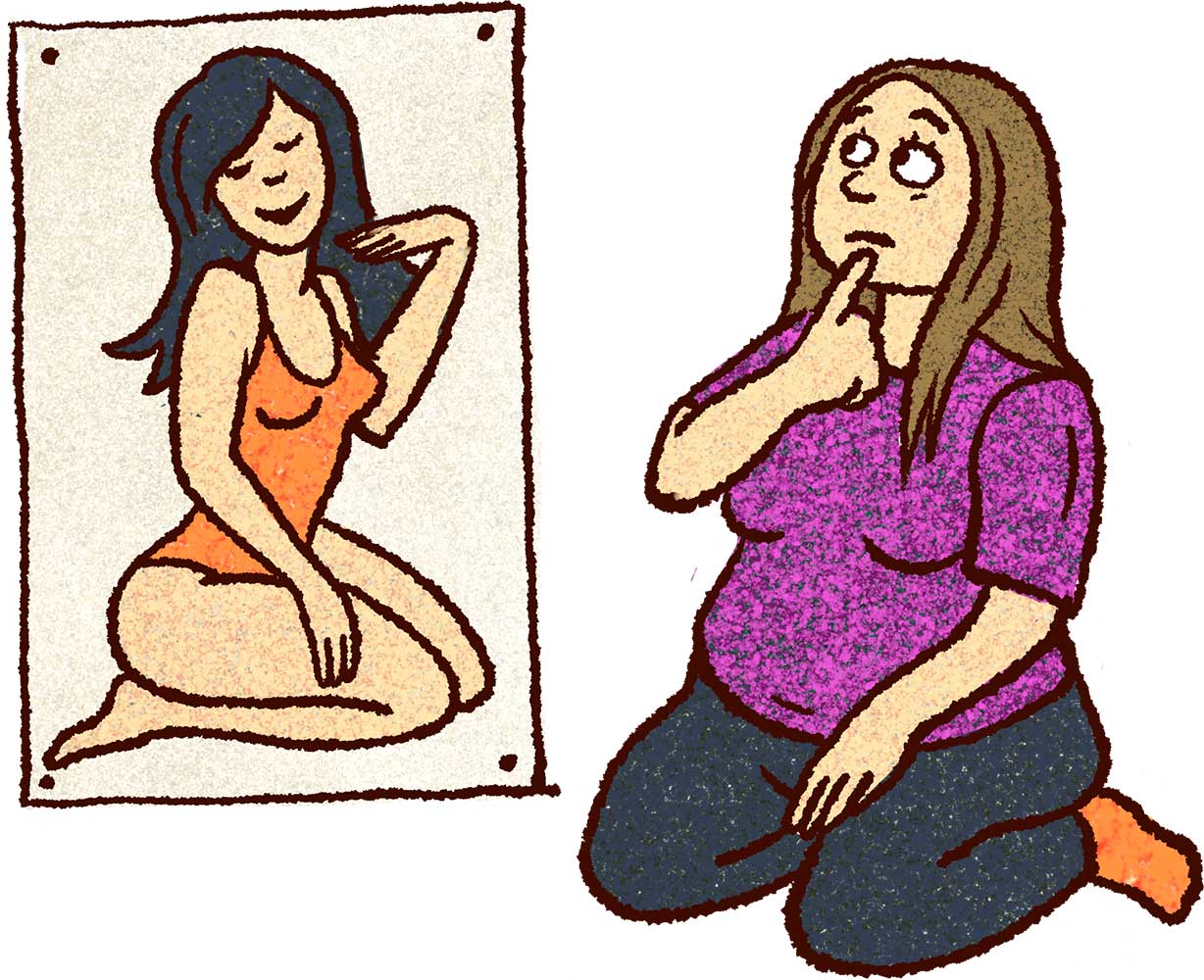
This is the age when puberty begins, which is a crucial developmental phase and not just physically. Puberty brings with it very drastic changes that can be emotional for children and parents alike. On the one hand, parents and children have to detach from each other, which also involves pain, arguments and sorrow. On the other hand, children continue to need parents during puberty who lovingly support them in the transition to adulthood.
You may notice that your child increasingly questions family rules at home. They also demand their own freedom to make decisions and distance themselves from being treated like a "child". Children retreat more often to their room or to a private place. These developments can create more tension between you and the child. At this point, the task is to adjust to the child's situation and not the other way around. Many children do not understand what is going on with themselves and later regret making defiant statements without being able to admit it. During puberty, the connections between individual neural pathways in the brain are reorganised and built up, which can trigger and intensify familiar emotional and behavioural reactions. When children get upset, there is no ill will behind it. Nerves are literally on edge and mood swings are common. Nevertheless, during this time, children especially need guidance and rules as well as clearly comprehensible behaviour on the part of their caregivers. It is often helpful not to redefine rules over and over again. Instead, communicate transparently so that the reasons behind the rules are conveyed.
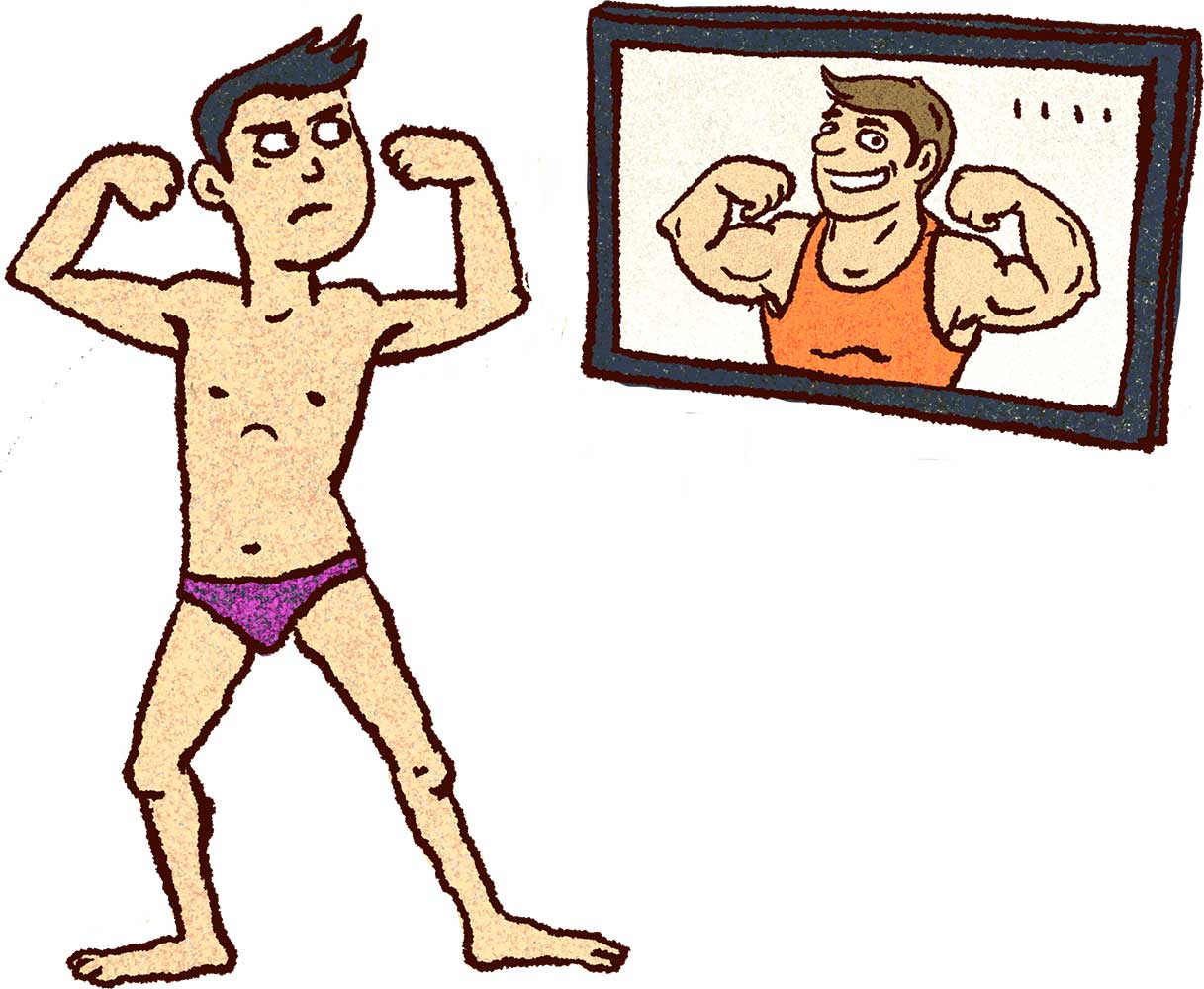
Relationships change
Due to the hormonal changes mentioned above, children become sexually mature and experience falling in love and related erotic fantasies in a different way than before. Sexual impulses become more urgent and masturbation gains in importance. First encounters and love relationships between adolescents take place. Adolescents go out together, hold hands and give each other kisses. Most of the time, adolescents are not as active as adults expect them to be. Nevertheless, adolescents usually do not want to be approached on these topics. They will often react to this in a dismissive or shameful way. Respect their boundaries and be happy about the new experiences your child is having.
Bullying and discrimination must be taken seriously
Young people are always exploring during this time. This also affects friendships from childhood, which sometimes break up temporarily or even permanently. New relationships are formed among young people. Many adolescents, with their insecurities, do not want to stand out and try to be mainstream. Bullying can occur during this time. Bullying is a form of violence that is often, deliberately perpetrated against people who appear more defenceless than others. There is a clear pattern of those involved. On one side is the bully and their supporters (who reinforce or assist) and on the other side is the victim and possibly a defender. Then there are outsiders who look on and are glad that they have not become a victim. If your child, in whatever role, speaks out about bullying in a group, it is important that you intervene.
Some children and adolescents do not conform to the supposed social norm. They often experience discrimination and violence.
Bullying occurs over a long period of time and can manifest itself in different ways: physically, with words or psychologically. Physical bullying is expressed through hitting, pushing, spitting and the like. Insulting, abusing or treating someone contemptuously usually takes place verbally or on the internet. Psychological bullying, on the other hand, takes the form of ridiculing, threatening, intimidating or spreading rumours about someone.
What can you do?
Suspected bullying - If you suspect your child is facing bullying or experiencing physical or psychological violence, visit a local counselling centre for children and adolescents, sometimes there is also social counseling at the school. This could be a suitable place to get help. Support your child and seek help together.
Cyberbullying is on the rise as a result of activity on the internet. There, young people are deliberately insulted, threatened, exposed or harassed by known or unknown persons. This can take place through different communication media like smartphones.
Emotions and moods of young people can change quickly and for outsiders usually without any apparent reason. Even small things can trigger impulsive reactions. Due to the restructuring of the brain, it is increasingly difficult to classify one's own feelings. It is important that you continue to maintain contact with your child during this special time. This will determine how your relationship with the child will develop in the long term. This also means clearly saying "no" to the child in certain situations, but at the same time you should signal that this does not affect your relationship. Always refer to the respective behaviour of the child and not to the whole person.
For example, by saying:
"I don't think this behaviour of yours is appropriate because you have disregarded our agreements."
This clearly indicates your attitude towards your child's behaviour. Together with a justification, the reaction becomes transparent for the child.
If an argument occurs, the reasons, rules and resulting decisions should be communicated in a transparent way. This is the only way that the young person will be able to understand the decision. The question "How can we find a solution together?" is often the most important question. Caregivers should engage in negotiations about rules and compromises during this difficult time. How far you go is up to individual discretion. Parents should be willing to listen and understand the child's feelings rather than reprimand. Giving advice, making comments or finding immediate solutions to a problem is also not advisable.
Make sure you accept apologies from your child and do not hold grudges. This can be very hurtful for the child. For every child in (pre-)puberty, two things are especially important: that they feel heard and understood. Being authentic and approachable towards your child is a good way of coping with this time together.
Love
Particularly during puberty, feelings are intense and can confuse or overwhelm children. Longing for their first kiss, their first time having sex or a steady partner are quite normal. Their interest in love and sex is growing. Adolescents want to have more and more control over themselves, their love life and their sexuality. The more you as parents interfere and issue prohibitions, the less your child will tell you. Try to accept your child's independent choice of partner, even if you don't like it. It only makes sense to interfere in the partnership and privacy when you are sure that your child will be harmed by the relationship.
The first time
Even if your child has yet to have their first sexual experience or intercourse, education about sex, contraception, pregnancy, relationships and love need to start. Many children worry about what the first time will be like, whether it will hurt, whether they have found the right partner or what the right time will be. Your child should know: Never do something you do not like. Accept a no from the other person. Only go as far as you want and do not allow yourself to be pressured. Make sure to tell your child that pregnancy is also possible during their first sexual intercourse. Therefore, it is important that your child is educated about contraception. You should also gently educate your child about STIs - especially on how they can protect themselves.
Your own experiences, attitudes and values will play a major role in the education of your own children. Often your values and ideas are transferred to your children unconsciously and without thinking. As parents, you can think about when your first time was and how you felt at that time. What experiences did you have? What do you want to pass on to your child about sexuality and relationships? Are friends allowed to stay overnight with your child? How and by whom were you educated? What did you miss, what helped you?
Puberty is a particularly stressful time for gay, lesbian or bisexual children. During late childhood, having a same-sex orientation may have been a rather vague feeling, but with puberty it gradually becomes a certainty. These children need support and above all acceptance from their parents. As parents, take time to get used to the new situation. Ask your child questions and listen in order to familiarise yourself with a possibly foreign world.
Masturbation plays an important role in the sexual development of children. Their own body can be explored, felt and discovered. This area of life is extremely intimate for children. There may be differences in masturbation behaviour between girls and boys, girls in particular may have fewer sexual experiences with masturbation. Boys often masturbate during or after consuming pornography.
Pornographic material and sexting
Exposure to pornography or sexually explicit material is taking place earlier and earlier and through a variety of channels. Consumption usually takes place via smartphones, mobile phones, laptops or computers. Especially in social media, children can also have unintentional contact with sexual depictions. Surveys have made it clear that children quite often receive or forward erotic pictures or videos.
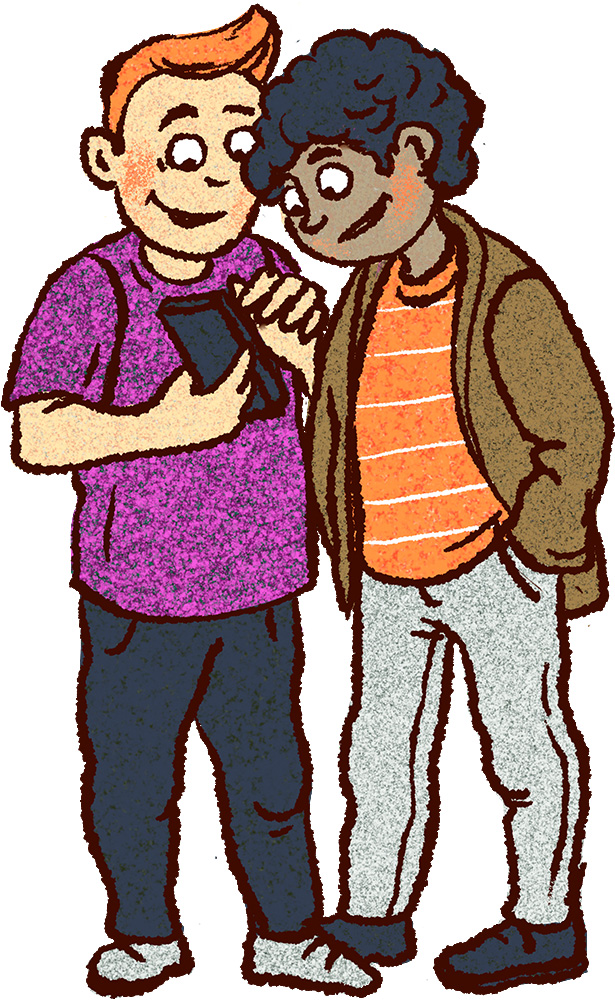
Educate your child at an early stage before they are exposed to pornography. Then they will be better able to categorise what they see. It is not possible to protect children from pornography. Even if you do not buy your child a smartphone or do not have a PC at home, he or she will still have contact with other children. Maintain good communication with your child about what they have seen. Talk to your child about the fact that pornography does not depict "real sex", but sexual fantasies and also violence. It has little to do with reality.
Sexting is a complex phenomenon that mostly takes place within a relationship. However, the material can sometimes be forwarded without the person's consent. Children should be aware of the dangers of sexting and practise critical thinking regarding social and ethical aspects, respect and empathy. Sexting can also be a part of sexual experimentation in adolescence. In selfies, the body is staged and can be a point of reference in the development of adolescents' sexual identity. Here, beauty norms or one's own attractiveness can be tested. Children should know that they may not be photographed or filmed without consent. Also, photos or films must not be forwarded or shown around without consent.
Sexual violence
It is important to educate and prevent sexualised violence even before the teenage years. Sexual transgressions mainly occur against girls, but other genders can also be affected. Victims are often pressured by the perpetrators that something bad will happen if they break their silence and confide in others. As a parent, you should listen carefully and believe your child when they give you hints about sexual violence. Be aware that sexual violence often takes place within the family or among acquaintances. Stay calm and decide together with your child what to do. Get help and support from professionals and organisations.
The behaviour of children who have experienced sexual violence varies greatly depending on their age and personality. Only a few children will say outright when they have experienced sexual violence, they tend to make hints because they lack the right words for what has happened. This is precisely why the hints are often not understood correctly. If you have the feeling that your child has experienced abuse, you should take this feeling seriously, follow it up and definitely seek help and support from counselling centres.

